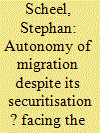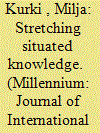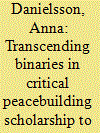| Srl | Item |
| 1 |
ID:
123588


|
|
|
|
|
| Publication |
2013.
|
| Summary/Abstract |
This article reconsiders the concept of autonomy of migration in the context of technologically ever-more sophisticated border regimes by focusing on the case of biometric rebordering. As its name suggests, the concept of autonomy of migration's core thesis proposes that migratory movements yield moments of autonomy in regards to any attempt to control and regulate them. Yet, the concept of autonomy of migration has been repeatedly accused of being based on and contributing to a romanticisation of migration. After outlining two advantages the concept of autonomy of migration offers for the analysis of biometric border regimes, I demonstrate that processes of biometric rebordering increase the warranty of the two allegations, which feed this major critique. Drawing on examples relating to the Visa Information System, I show that processes of biometric rebordering alter the practical terms and material conditions for moments of autonomy of migration to such an extent that it becomes necessary to rethink not only some of the concept of autonomy of migration's central features, but the notion of autonomy itself. In the final section, I therefore point out some directions to develop the concept of autonomy of migration as an approach, which is better equipped to investigate today's struggles of migration without being prone to the critique of implicating a romanticisation of migration.
|
|
|
|
|
|
|
|
|
|
|
|
|
|
|
|
| 2 |
ID:
194306


|
|
|
|
|
| Summary/Abstract |
This article explores questions of positionality in relation to the gaze towards migrants; it is centred on an analysis of three films produced in Europe in the wake of public discussions on migration. It argues that each of these films shows an affinity with one of three possible theoretical approaches in migration research: Fuocoammare is interpreted as corresponding to the mainstream scientific gaze and the humanitarian gesture; Les Sauteurs is considered in relation to the ‘autonomy of migration’ paradigm followed in much critical migration research; and Those who feel the fire burning is analysed through the haunting paradigm or ‘spectral turn’ that has been incipiently explored with regards to migration. I develop parallels between the films’ conceptual and visual positioning and these research approaches, formulating questions of relationality towards migrants before European audiences. Rather than presenting an analysis of the films for their formal or aesthetic qualities, they are taken as a point of entry to reflect on our own positionality and choices as scholars.
|
|
|
|
|
|
|
|
|
|
|
|
|
|
|
|
| 3 |
ID:
139417


|
|
|
|
|
| Summary/Abstract |
This article is driven by the belief that there is great potential benefit in carefully considering the implications of ‘situated knowledge’ in IR scholarship. This can be helpful not just for scholars thinking through meta-theoretical puzzles in International Relations (IR), but also for shaping concrete knowledge practices in international political practice today. Yet, there seems to be something of an unresolved puzzle at the heart of the situated knowledge paradigm: a puzzle relating to what the situatedness of knowledge entails and how we should ‘deal with it’. This piece suggests that philosophical and social theoretical, and by extension also IR theoretical, engagements with situated knowledge can benefit from being considered anew: from the point of view of theoretical physicists and cosmologists. While not always reflexive concerning ‘social’ situatedness, the physicists and cosmologists considered here have reflected on aspects of situatedness that have been under-emphasised in standpoint philosophy. Crucially, physics and cosmology framings of situated knowledge can help to show why dealing with situated knowledge should mean more than attentiveness to various knowers and their positionality, and more than reflexive ‘dialogue’ between knowers; it also seems to require ‘stretching beyond’ the horizons of ‘situated knowers’. It is suggested that science is, and perhaps even ‘scientifically aspirant’ IR then should be, about imaginative conceptual ‘stretching’ rather than merely ‘situating’. This stretching should go hand in hand with opportunistic but critical methodological probing, seeking to push us ‘beyond’ how we understand the world from our situated perspectives. The provocations developed here have three main audiences in IR: scholars engaged in meta-theoretical debates in IR, those studying international politics through the situated knowledge approach, and also critical theorists seeking to understand conditions of critique.
|
|
|
|
|
|
|
|
|
|
|
|
|
|
|
|
| 4 |
ID:
171932


|
|
|
|
|
| Summary/Abstract |
In light of the recent turn to ‘inclusivity’ in peacebuilding practice, this article problematises established ways of ‘doing critique’ in peacebuilding scholarship. Inclusivity refers to the building of peace as a situated and co-constituted process. This entails what can be termed a new epistemic commitment: the acknowledgement that peacebuilding as a dynamic and emergent phenomenon is also an epistemically co-constituted process. In the article, I make two arguments. First, the move towards inclusivity places currently dominant modes of scholarly critique at an impasse. Persistent ontological and epistemological binaries preclude a productive investigation and challenging of inclusivity projects and their epistemic commitment. Second, I argue that, by returning to historical conditions that were formative in the very emergence of the category of ‘the local’, the conceptual basis of an alternative mode of critique (re)appears. This alternative critical project allows for an analytical sensibility to peacebuilding as emergent and adaptive. It makes it possible to disentangle power relations as these emerge between different and possibly unexpected configurations of actors and knowledge claims in inclusivity projects
|
|
|
|
|
|
|
|
|
|
|
|
|
|
|
|